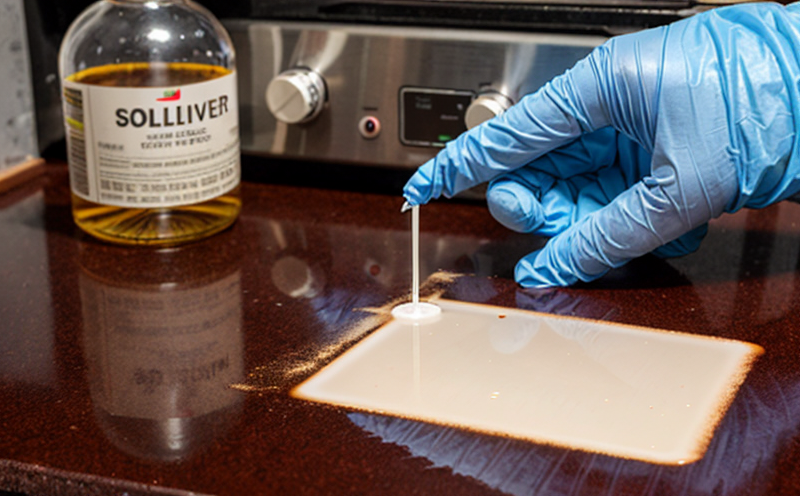Dairy Product Solvent Residue Testing
Dairy product solvent residue testing is a critical component of ensuring food safety and quality standards in the dairy sector. This service involves the analysis of dairy products to ensure that they do not contain excessive levels of solvents, which can pose significant health risks if present. The primary focus here is on identifying residual amounts of solvents such as methanol, ethanol, and other potentially harmful substances that may have inadvertently entered the product during manufacturing or processing stages.
The importance of this testing cannot be overstated, especially considering the high sensitivity of dairy products to contamination. Even trace amounts of solvent residues can compromise the integrity of the product, leading to potential health hazards for consumers. Therefore, stringent quality control measures are essential in ensuring that these residues do not exceed acceptable limits.
Dairy manufacturers rely on meticulous testing processes to maintain compliance with international standards and regulations set forth by bodies like ISO and ASTM International. These organizations provide guidelines that help laboratories establish the acceptable ranges for solvent residues in different dairy products.
The testing process typically begins with the collection of samples from various points within the manufacturing plant. Samples are then prepared according to specific protocols designed by qualified experts. Once prepared, these samples undergo rigorous analysis using advanced analytical techniques such as gas chromatography (GC), high-performance liquid chromatography (HPLC), and Fourier transform infrared spectroscopy (FTIR). Each method has its unique advantages depending on the type of solvent being detected.
It is important to note that different dairy products may require varying levels of precision when it comes to detecting solvent residues. For instance, infant formula might have more stringent requirements than regular milk due to the heightened sensitivity among young consumers. Similarly, certain processing methods could lead to higher concentrations of solvents in specific batches compared to others.
The results from these analyses are crucial not only for meeting regulatory requirements but also for protecting brand reputation and consumer trust. By adhering strictly to established protocols and utilizing state-of-the-art equipment, laboratories like Eurolab can provide accurate and reliable data regarding solvent residues in dairy products. This ensures that manufacturers remain compliant with both local laws and international standards.
Given the complexity involved in conducting such tests accurately and efficiently, it is advisable for companies operating within this sector to partner with experienced third-party labs specializing in dairy product testing services. Such partnerships allow businesses to focus on their core operations while leaving technical aspects like solvent residue detection to specialized professionals who possess extensive knowledge about relevant methodologies.
Applied Standards
Dairy product solvent residue testing follows several internationally recognized standards which guide laboratories in performing these analyses. The most commonly referenced standard for this purpose is ISO 15686-3:2017, specifically dealing with "Determination of organic solvents in foods—Part 3: Foods derived from animals." This standard provides detailed procedures for extracting and quantifying various types of organic solvents present in dairy products.
Another relevant standard is ASTM E1594-18, which covers the determination of volatile organic compounds (VOCs) including solvents. This method utilizes thermal desorption coupled with gas chromatography/mass spectrometry (GC/MS), making it suitable for detecting extremely low concentrations of solvents.
For more precise determinations involving particular solvent classes, additional methods such as those found in EN 14659-2 might be employed. This European norm specifies procedures for measuring alcohol content in alcoholic beverages but can also apply to similar situations where ethanol is involved.
Industry Applications
Dairy product solvent residue testing finds application across various segments of the dairy industry, from raw material suppliers to finished goods manufacturers. Here are some key areas where this service proves invaluable:
- Raw Material Inspection: Ensures that incoming milk or cream does not contain any unwanted solvents introduced during transportation.
- Process Monitoring: Helps identify potential issues early on in the production cycle, preventing contamination before it affects large quantities of product.
- Quality Control: Verifies that final products meet required specifications and comply with regulatory guidelines.
- Batch Consistency: Guarantees uniform quality across different batches produced under similar conditions.
| Product Type | Acceptable Solvent Residue Limits (ppm) |
|---|---|
| Milk Powder | <10 ppm |
| Baby Formula | <20 ppm |
| Cheese | <5 ppm |
These limits vary based on the specific product type and regulatory requirements applicable to each category. Compliance with these standards helps maintain consumer safety and confidence while upholding brand integrity.
Eurolab Advantages
At Eurolab, we pride ourselves on providing comprehensive dairy product solvent residue testing services tailored specifically for the needs of our clients across various sectors. Our expertise lies in delivering accurate results consistently and efficiently through cutting-edge technology supported by experienced personnel.
- Advanced Equipment: Utilizes industry-leading instruments capable of detecting even trace amounts of solvents, ensuring precision and reliability.
- Certified Personnel: Employ only highly trained professionals who adhere strictly to established protocols when conducting tests.
- Comprehensive Reporting: Offer detailed reports explaining findings alongside recommendations for corrective actions if necessary.
- Rapid Turnaround Times: Provide quick turnaround times without compromising on accuracy, allowing clients to make informed decisions promptly.
We understand that every client has unique requirements; therefore, we customize our services accordingly. Whether you need routine testing or one-off assessments, Eurolab stands ready to meet your needs with professionalism and commitment.





